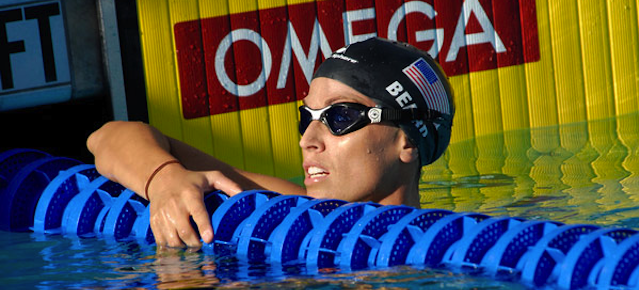
Athletics are really only one part of the Olympic Games. At least when it comes to American television, the parade of human interest stories has slowly taken on equal importance as the events themselves, sometimes even overshadowing them. The stories are usually familiar: the long hard road to excellence, the valiant overcoming of obstacles, the preternatural talent, the indispensable coach/father figure, etc. They can be inspiring, exasperating, humbling, amazing, and sometimes alienating. The X factor, of course, is how they end. When things go as planned, a la Michael Phelps, it’s pure magic. When they don’t, well, there’s inevitably another story nipping at its heels to distract us from the disappointment. Of course, from a theological perspective, the Olympic Games and the attendant testimonials bespeak a theology of glory, that God blesses those who work hard, that he’s on the side of the strong, that he is glorified (primarily) in victory, etc. Not that there’s anything terribly wrong or unexpected about that as far as the Olympics go – the theology of glory is the default setting of the human race, after all, and we all love a good honest-to-God redemption story. It would be a boring event without a little underdog drama or celebration.
When it comes to the Gospel, however, the story is quite different. It’s one of defeat, of a beaten and abandoned savior dying a criminal’s death. No fairytale ending, pun intended, at least not the one we want. Which is, perhaps, why it was such a welcome surprise to read the story of former world record-holder and Olympic breast-stroker Amanda Beard that appeared in the NY Times the other day, a fitting addendum to Sean’s recent post on freedom. As our title suggests, her trajectory involves crushing expectations, public failure and… joyful freedom. It’s a thrilling, real-life example of life coming out of (a kind of) death, hope issuing from reversal, and the search for glory yielding to something more powerful and, dare I say, true. But don’t take my word for it:
Throughout her teens and well into her 20s, [Amanda] Beard presented an image to the world that was as airbrushed as her photographs in magazines. Her toothy smile and surfer girl insouciance hid deep emotional pain. In a series of interviews over the past year, she revealed for the first time her struggles with anger, depression and self-injury.
Beard said she had not engaged in self-destructive behavior in two years. Her road to contentment was paved by events at opposite ends of her broad emotional bandwidth: performing poorly at the 2008 Olympics and becoming a mother.
She failed to advance out of the preliminaries in Beijing, a devastating result that ultimately proved liberating because it helped her shed the wrinkle-free persona that had become such a constricting second skin. Beard has since settled into a new identity — wife and mother — that fits her much more comfortably.
Beard’s parents, Dan and Gayle, divorced in 1996, and Beard, the youngest of their three daughters, was distraught. “I’d go to swim practice, put my face in the water, and I didn’t have to talk to anybody,” Beard said. “Swimming was like my escape, but it was also like this huge prison because I felt like I had to swim up to people’s standards.”
She said she hid her sadness and anger from everyone and overcompensated by trying to make everybody happy. Her father, Dan, said, “She’s incredible at being able, no matter what kind of turmoil she’s having personally, to be outwardly very gregarious and endearing.”
Beard said she drank beer for the first time at 14, during the Atlanta Olympics. For the next decade, she said, she variously abused alcohol and recreational drugs and developed disordered eating as she struggled to reconcile her low self-image with her high profile.
“I just kind of put a smile on my face and just pretended a lot of the time,” Beard said, adding, “I always felt like I didn’t want to be a role model because if people knew the real me or the things I was doing or going through, there’s no way they’d want their kid to be like me.”
Beard said she felt sluggish in the days leading to her first swim at the 2008 Olympics. She posted the 18th-fastest time in the preliminaries of the 200-meter breaststroke.
For someone who believed she had to succeed to feed her public persona, it was a crushing disappointment. “I felt like I let everybody down,” she said. In the days afterward, her family and friends lifted her mood, and Beard had an epiphany: she did not have to win every race or come across as perfect to be loved.
“I don’t even know how to explain how much she’s changed and grown in a pretty short time,” Brown said. “It’s happened because she’s been able to let go of other people’s idea of her, let go of that persona she thinks she has to be, that person who feels like she has to be on all the time, and just be herself.”

COMMENTS
Leave a Reply













